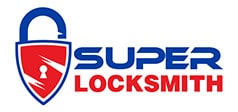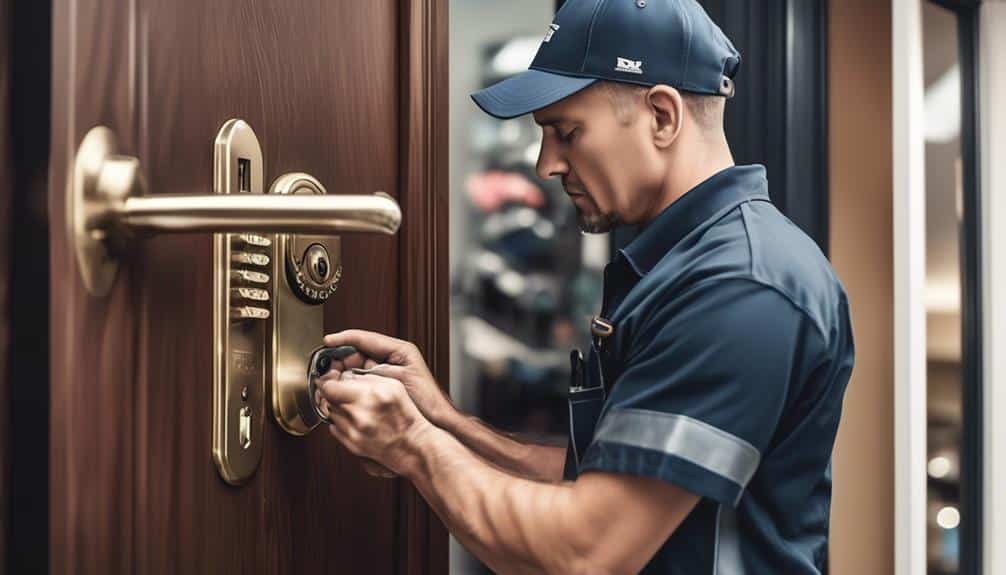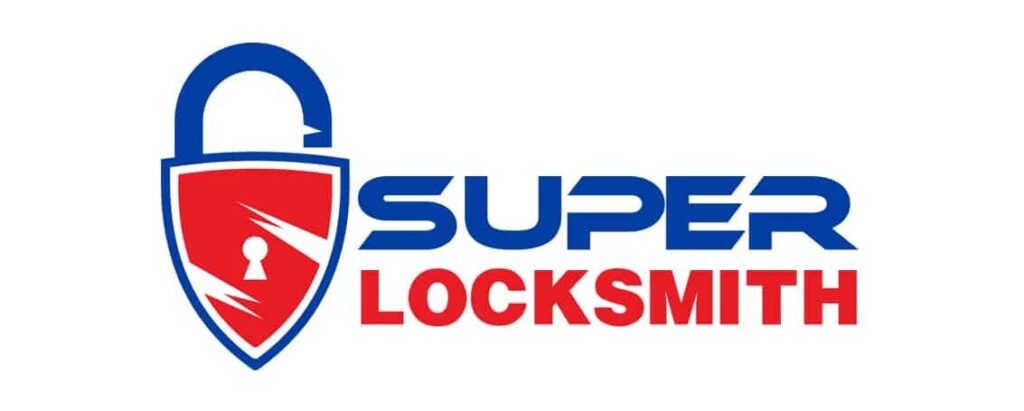As we unlock the secrets to securing your retail store, it becomes clear that the key to success lies in expert lock installation solutions.
Just like a well-oiled machine, a properly installed lock ensures the smooth operation and protection of your business.
But how do you choose the right lock, avoid common mistakes, and ensure a secure retail environment?
Join us as we navigate through the intricate world of lock installation, providing you with valuable insights and practical tips that will leave you with a newfound sense of security.
Importance of Professional Lock Installation
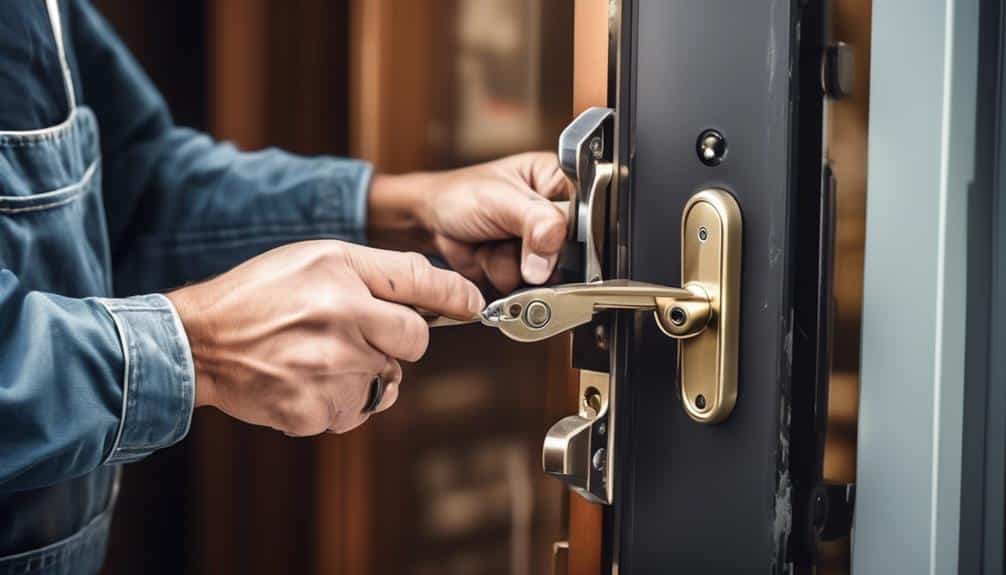
When it comes to ensuring the security of your retail store, professional lock installation is of utmost importance. Hiring a professional locksmith to install your locks can provide numerous benefits that directly impact the safety and security of your store.
One of the key factors affecting lock longevity is the quality of the installation. Professional locksmiths have the expertise and knowledge to properly install locks, ensuring that they function optimally and are resistant to tampering or forced entry. Improper installation can weaken the lock's effectiveness and compromise the security of your store.
Additionally, professional lock installation ensures that all necessary security measures are taken into account. Locksmiths can assess your specific needs and recommend the most suitable locks for your retail store. They can also install additional security features, such as deadbolts or keyless entry systems, to enhance the overall security of your premises.
Furthermore, regular lock maintenance is essential for the longevity and reliability of your locks. Professional locksmiths can provide regular maintenance services, such as lubrication and adjustments, to keep your locks in optimal condition. This regular upkeep helps prevent issues such as jamming or malfunctioning, ensuring that your locks continue to provide the level of security you require.
Factors to Consider Before Installing Locks
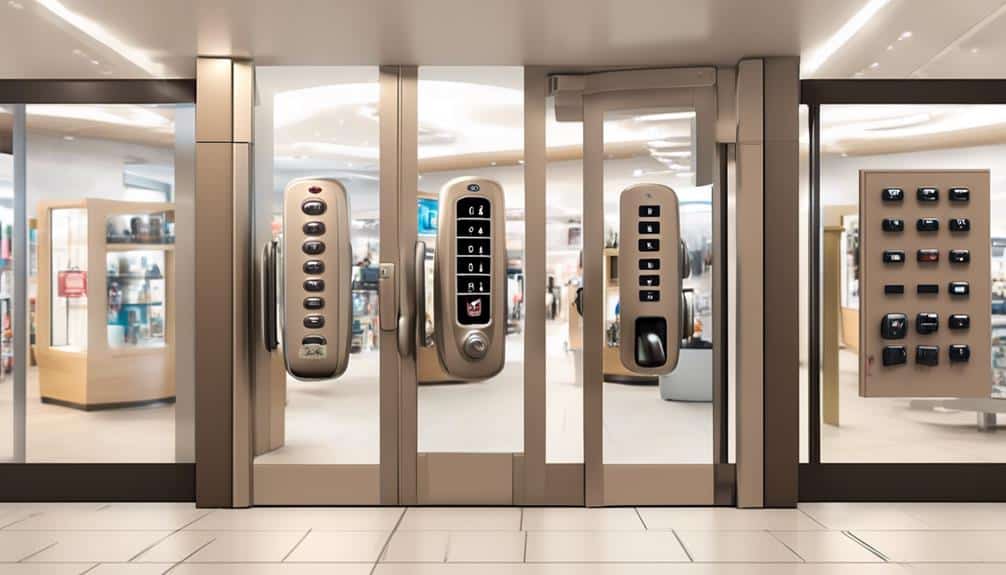
Before installing locks in a retail store, there are several factors to consider.
First, security considerations should be taken into account, such as the level of protection needed and any specific vulnerabilities of the premises.
Second, the type and features of the locks should be carefully chosen to ensure they meet the specific requirements and provide the desired level of security.
Security Considerations
To ensure optimal security for retail stores, it's essential to carefully assess various factors before proceeding with lock installation. Key considerations include the type of locks to be installed, the level of security required, and the specific needs of the store.
One of the most important security measures to consider is the quality of the locks themselves. High-quality locks, such as deadbolts or electronic locks, can provide better protection against break-ins.
Additionally, it's crucial to evaluate the vulnerability of entry points, such as doors and windows, and install appropriate locks accordingly. Store owners should also consider implementing additional security features, such as surveillance cameras and alarm systems, to enhance overall protection.
Lock Types and Features
We carefully consider various factors, such as lock types and features, before installing locks to ensure optimal security for retail stores.
One important factor to consider is lock maintenance. Choosing locks that require minimal maintenance can save time and money in the long run.
Additionally, keyless entry systems are becoming increasingly popular in retail stores due to their convenience and enhanced security. These systems eliminate the need for physical keys, making it easier to manage access and reducing the risk of lost or stolen keys. Keyless entry systems also offer advanced features such as remote access control and real-time monitoring.
Professional Installation Benefits
Considering the benefits of professional installation is crucial when it comes to installing locks for retail stores. Professional installation offers several advantages that ensure the security and reliability of the locks. Here are some reasons why professional installation is important:
- Expertise: Professionals have the knowledge and experience to install locks correctly, ensuring optimal functionality.
- Security: Professional installation ensures that the locks are installed securely, minimizing the risk of break-ins and unauthorized access.
- Time-saving: Professionals can efficiently install locks, saving valuable time for retail store owners.
- Professional maintenance: When professionals install locks, they can also provide ongoing maintenance services, ensuring the locks remain in optimal condition.
- Advantages of electronic locks: Professionals can advise on the benefits of electronic locks, such as increased security features and convenience.
Different Types of Locks for Retail Stores
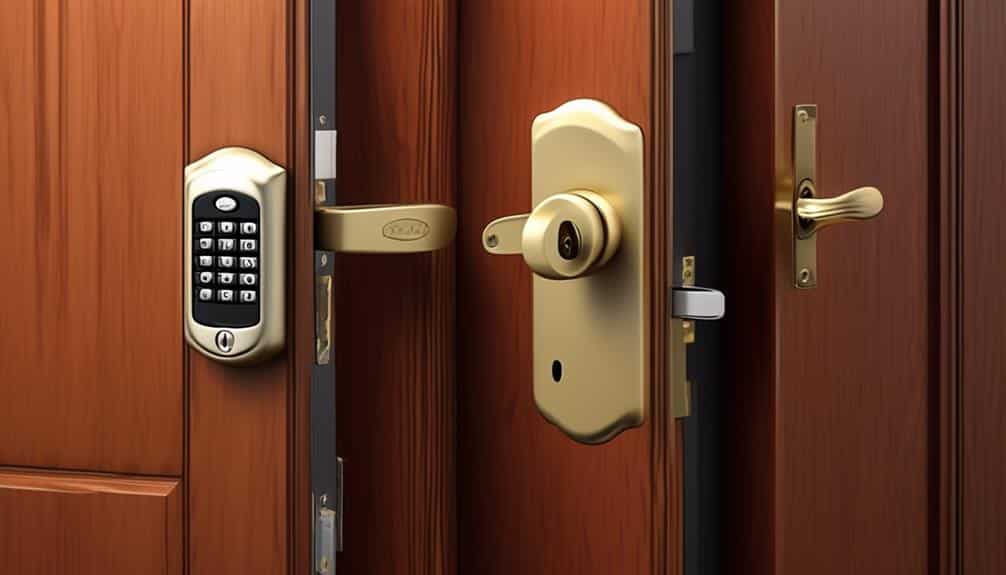
What are the different types of locks that retail stores can use to enhance security?
When it comes to securing a retail store, choosing the right type of lock is crucial. There are various lock brands available in the market, each offering different features and levels of security. Some popular lock brands for retail stores include Schlage, Kwikset, and Yale. These brands offer a wide range of options, from traditional key locks to more advanced electronic locks.
The lock installation cost for retail stores can vary depending on the type of lock chosen and the complexity of the installation process. Traditional key locks tend to be more affordable, while electronic locks with advanced features may be more expensive.
One common type of lock used in retail stores is the deadbolt lock. Deadbolts are known for their strength and durability, making them an excellent choice for securing entry doors.
Another option is the keypad lock, which allows access through a numeric code. These locks are convenient as they eliminate the need for keys and can be easily reprogrammed if needed.
For added security, retail stores can also consider installing a master key system. This system allows for different levels of access, with a master key that can open multiple locks. This is particularly useful for larger retail establishments with multiple entrances and restricted areas.
Benefits of High-Security Locks for Retailers
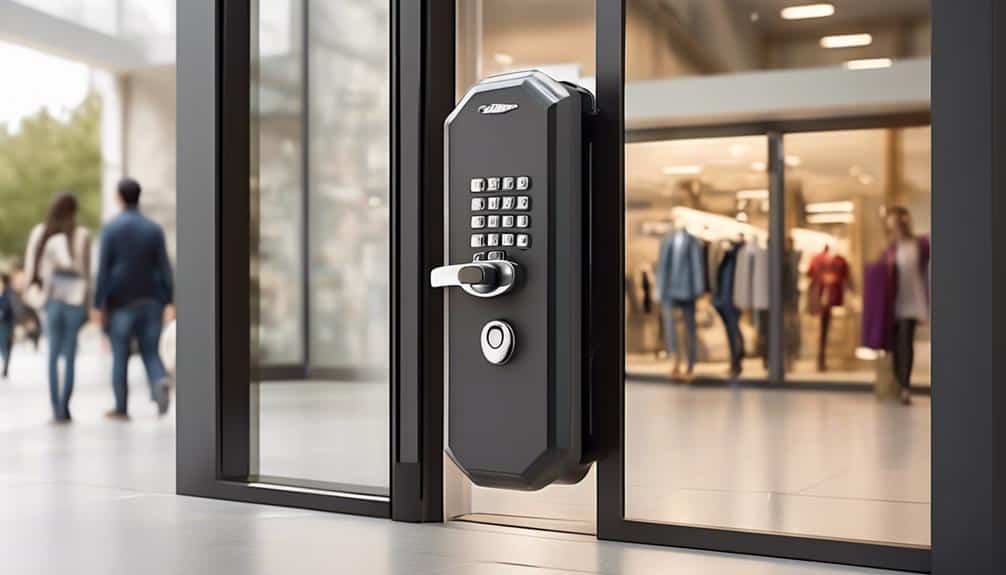
To further enhance the security of their retail stores, retailers can benefit from investing in high-security locks. These locks offer a level of protection that goes beyond traditional lock systems, providing added peace of mind for store owners and their customers.
Here are some key benefits of high-security locks:
- Enhanced Resistance to Forced Entry: High-security locks are designed to withstand various methods of forced entry, such as picking, bumping, and drilling. This makes it significantly more difficult for burglars to gain unauthorized access to the store.
- Restricted Key Duplication: High-security locks often utilize patented key systems that can only be duplicated by authorized locksmith services. This prevents unauthorized key copies from being made, reducing the risk of unauthorized access.
- Keyless Entry Systems: Some high-security locks offer keyless entry options, such as keypad or card access systems. This eliminates the need for physical keys, which can be lost or stolen, and provides an added layer of convenience for store owners and employees.
- Increased Accountability: High-security locks often come with advanced features such as audit trails, which record every access attempt. This helps to track and identify any suspicious activity, increasing accountability within the store.
- Insurance Discounts: Investing in high-security locks may make retailers eligible for insurance discounts. Insurance companies recognize the added protection that these locks offer and are often willing to provide reduced premiums as a result.
Steps to Properly Install Locks on Store Entrances
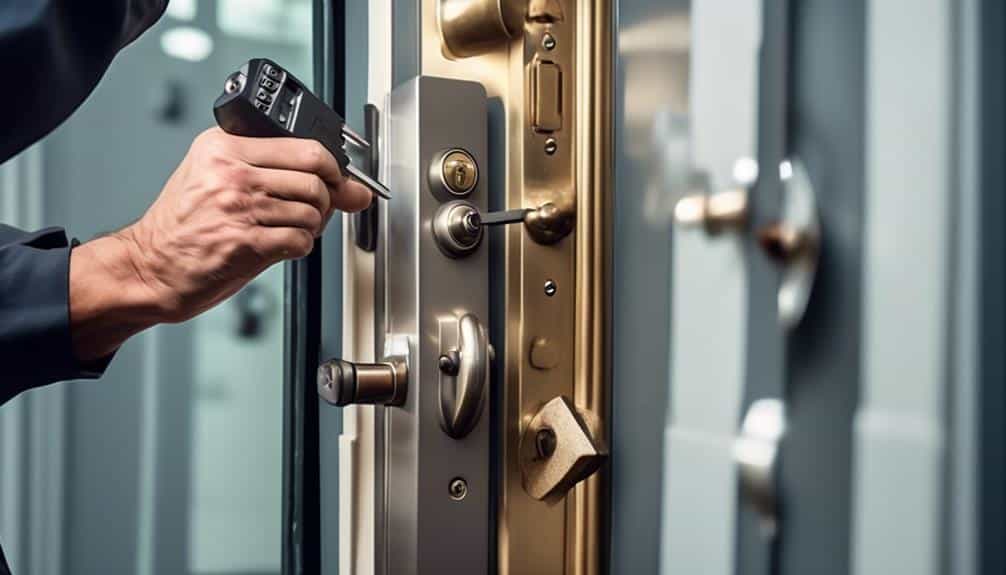
We will now discuss the necessary steps for properly installing locks on store entrances. When it comes to lock installation, having the right tools is crucial. You'll need a drill, a hole saw, a chisel, a screwdriver, and a measuring tape. These tools will help you accurately install the lock and ensure its functionality.
The first step is to measure the door and mark the positions for the lockset and deadbolt. Make sure to follow the manufacturer's instructions to determine the correct measurements. Once you have marked the positions, use the hole saw to create holes for the lockset and deadbolt.
Next, you'll need to chisel out the mortise for the lockset. This will allow the lock to fit into the door properly. Take your time and be precise when using the chisel to avoid any mistakes.
After chiseling out the mortise, it's time to install the lockset and deadbolt. Follow the manufacturer's instructions to ensure proper installation. Use the screwdriver to secure the lockset and deadbolt in place.
Common installation mistakes to avoid include not measuring accurately, not using the correct tools, and rushing through the installation process. Take your time, double-check your measurements, and follow the instructions carefully to ensure a secure lock installation.
Essential Tools for Lock Installation in Retail Stores
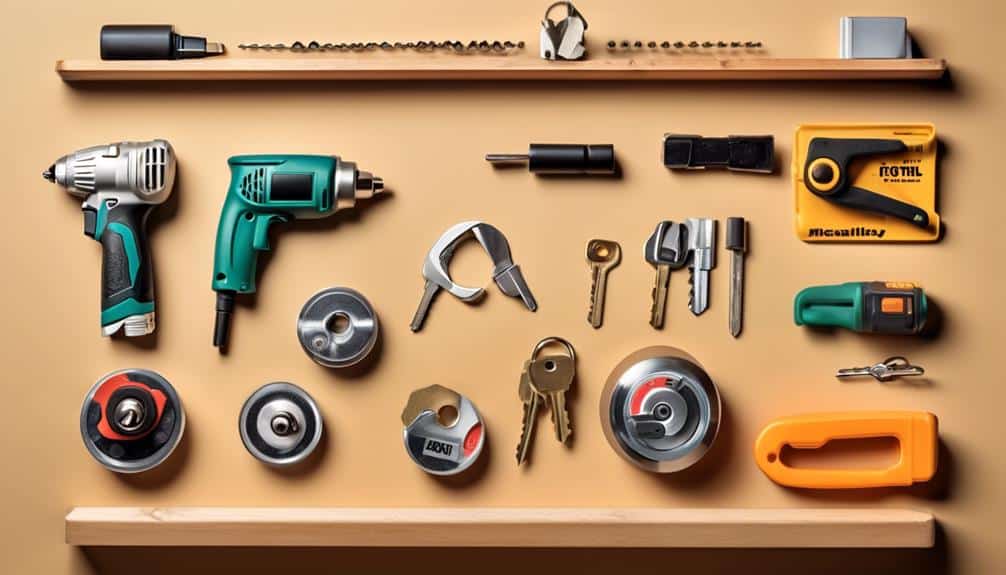
When it comes to lock installation in retail stores, having the right tools is essential. We need key tools for installation, such as screwdrivers, drills, and a good quality lockset. With these tools, we can ensure an efficient lock installation process that meets the security needs of the store.
Additionally, proper hardware installation is crucial to ensure the lock functions effectively and provides the necessary level of protection.
Key Tools for Installation
One essential aspect of lock installation in retail stores is having the key tools necessary for the job. The right tools not only make the installation process smoother but also ensure the security of the store. Here are five key tools that are essential for lock installation in retail stores:
- Drill: A drill is needed to create holes for the lock and latch installation.
- Screwdriver: A screwdriver is used to tighten screws and fix the lock in place.
- Chisel: A chisel is necessary for creating a recess in the door frame for the latch plate.
- Pliers: Pliers are used to hold and position small parts while installing the lock.
- Measuring Tape: A measuring tape is essential for accurately determining the placement of the lock and latch.
Efficient Lock Installation
To efficiently install locks in retail stores, it's crucial to have the necessary tools at hand. When it comes to cost-effective and time-saving lock installation, there are a few key tools that every locksmith should have.
Firstly, a good quality drill with different drill bits is essential for creating holes in the door or frame for the lock installation.
Additionally, a screwdriver set with various sizes and types of screwdrivers is necessary for securing the lock in place.
A door lock installation kit, including a template and hole saw, can greatly simplify the process and ensure accurate placement.
Lastly, a measuring tape and level are vital for ensuring proper alignment and symmetry.
Investing in these tools won't only make lock installation in retail stores more efficient, but also save time and money in the long run.
Proper Hardware Installation
For efficient lock installation in retail stores, it's essential to have the proper tools at hand. Here are the essential tools you need for proper hardware installation:
- Screwdriver set: A set of screwdrivers with different types and sizes of heads will allow you to handle various types of screws during lock installation.
- Drill machine: A drill machine with drill bits of different sizes is necessary for creating holes in the door or frame for the lock installation.
- Chisel: A chisel helps in making precise cuts and adjustments on the door or frame to ensure a proper fit for the lock.
- Hammer: A hammer is required for driving in nails, securing the lock components, or making adjustments during installation.
- Measuring tape: Accurate measurements are crucial for proper hardware installation, and a measuring tape helps you ensure precise placement of the lock components.
Common Mistakes to Avoid During Lock Installation
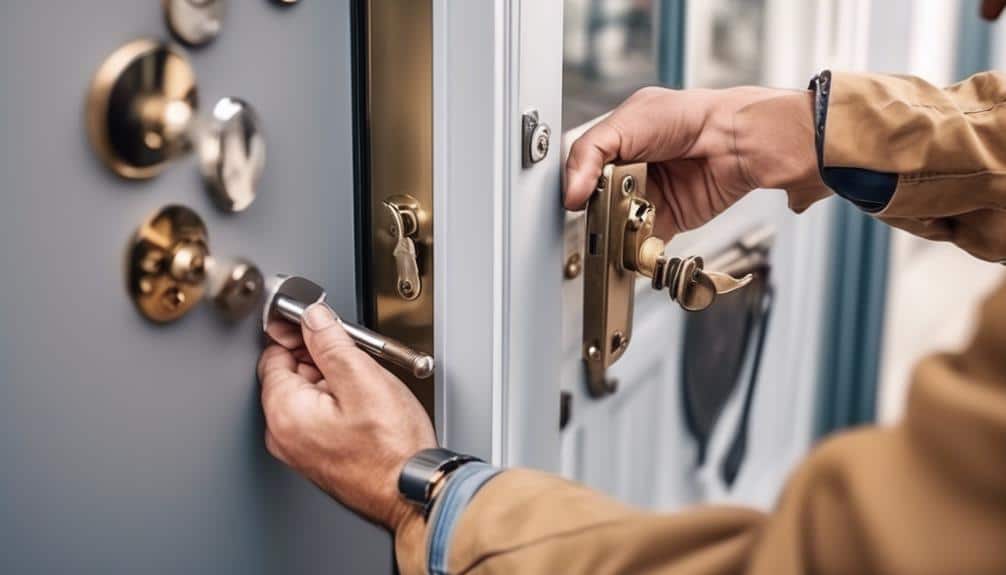
When it comes to lock installation, it's crucial to avoid common mistakes that could compromise the security of retail stores. Making errors during the installation process can leave your store vulnerable to break-ins and theft. To ensure proper lock installation, there are a few common mistakes that you should be aware of and avoid.
One common mistake is failing to choose the right lock for your retail store. It's important to select a lock that's suitable for the level of security you require. This includes considering factors such as the type of door, the location of the store, and the value of the merchandise inside.
Another mistake to avoid is improper alignment of the lock. If the lock isn't aligned correctly, it may not function properly and could be easily bypassed by intruders. Take the time to carefully align the lock during installation to ensure it's secure and functions as intended.
Additionally, using low-quality or faulty locks is a mistake that can compromise the security of your retail store. Always invest in high-quality locks from reputable manufacturers to ensure they're reliable and can withstand tampering attempts.
Lastly, overlooking regular maintenance and inspections can also lead to security vulnerabilities. It's important to regularly inspect your locks and perform any necessary maintenance to keep them in optimal condition.
Hiring a Qualified Locksmith for Retail Store Security
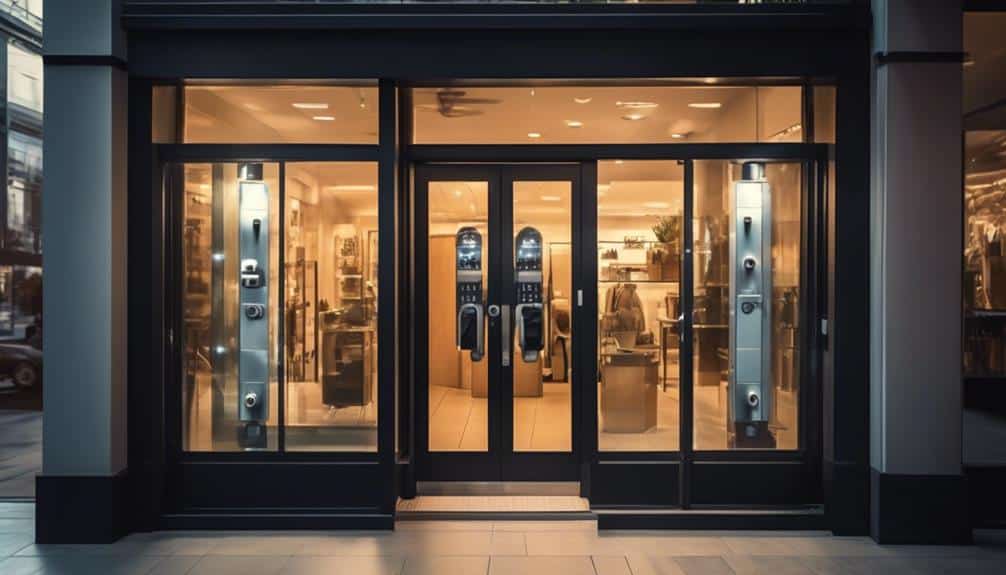
Hiring a qualified locksmith is essential for ensuring the security of your retail store. When it comes to protecting your merchandise and assets, you need to rely on professionals who specialize in retail store locksmith services. Here are some key reasons why hiring a qualified locksmith is crucial for your retail store security:
- Expertise: A qualified locksmith has the knowledge and skills to assess your store's security needs and recommend the most appropriate locking systems.
- Experience: Locksmiths with experience in retail store security understand the unique challenges and vulnerabilities that come with protecting a commercial space.
- Access to High-Quality Products: A qualified locksmith can provide you with access to high-quality locks and security systems that are designed to withstand break-ins and unauthorized access.
- Cost-Effectiveness: While locksmith services for retail stores may come at a cost, the investment is worth it considering the potential losses you could face in case of a security breach.
- Peace of Mind: By hiring a qualified locksmith, you can have peace of mind knowing that your store is protected by reliable and effective security measures.
When considering the locksmith cost for retail stores, it's important to remember that the price will vary depending on factors such as the complexity of the job, the type of locks and security systems required, and the reputation and expertise of the locksmith. It's advisable to consult with multiple locksmiths and obtain quotes to ensure you're getting the best value for your money.
Frequently Asked Questions
Can I Install Locks on My Retail Store Entrances on My Own, or Do I Need to Hire a Professional Locksmith?
Installing locks on retail store entrances on your own may seem like a simple task, but it can have disastrous consequences.
The pros of self-installation include saving money and feeling accomplished.
However, the cons are numerous, such as lack of expertise and potential security vulnerabilities.
On the other hand, hiring a professional locksmith offers numerous advantages, including their expertise, precision, and ability to ensure maximum security.
Don't take chances with your store's safety – leave it to the professionals.
Are There Any Specific Regulations or Standards That I Should Consider When Installing Locks on My Retail Store Entrances?
When it comes to installing locks on our retail store entrances, it's important for us to consider any specific regulations or standards that may apply.
Retail store entrance lock regulations may vary depending on our location and the type of store we have.
It's recommended to consult with a professional locksmith who's knowledgeable about lock installation for retail store entrances. They can ensure that the locks meet all necessary requirements and provide expert guidance throughout the process.
What Are the Potential Consequences of Improperly Installed Locks on My Retail Store Entrances?
Improperly installed locks on our retail store entrances can have serious consequences. They can compromise the security of our store, making it vulnerable to break-ins and theft.
Additionally, if the locks aren't installed correctly, they may not function properly, causing inconvenience and frustration for both employees and customers.
That's why it's crucial to rely on professional locksmiths for retail store lock installation. They have the expertise and knowledge to ensure that our locks are installed correctly and provide maximum security.
Are There Any Additional Security Measures That I Should Consider Alongside Lock Installation for My Retail Store?
When it comes to securing our retail store, we should always consider additional security measures alongside lock installation. One interesting statistic to grab your attention is that 34% of burglars enter through the front door. This highlights the importance of having strong locks and other security measures in place.
Professional locksmiths can provide benefits such as expertise in assessing vulnerabilities, recommending appropriate security systems, and installing them correctly. By investing in these measures, we can enhance the safety of our retail store and protect our valuable assets.
How Often Should I Schedule Maintenance or Inspection for the Locks on My Retail Store Entrances to Ensure Their Optimal Performance and Security?
We recommend scheduling regular maintenance or inspections for the locks on our retail store entrances to ensure their optimal performance and security. Regular lock maintenance frequency depends on various factors such as the type of locks, usage, and environmental conditions.
